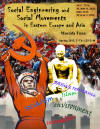|
Social Engineering and Social Movements in Eastern Europe and Asia Spring 2015 SES375S, HIS 333S, POLSCI 359, PUBPOL 282S SS, CZ & CCI, EI |
click for
poster |
Combining the perspectives of political sociology and
history, this course questions the respective roles of state policies and
social movements in transforming societies. We explore concepts such as
social engineering, violence, revolution, totalitarianism, social movements,
non-violent resistance, collective action, and many others in
historically-informed case studies of:
-
colonialism and anticolonial movements (passive resistance and
nationalism) in India
-
revolutionary communism, socialist reconstruction of society, everyday
resistance, and collective dissent in the Soviet Bloc
-
authoritarian capitalism and dissent in the form of environmentalist and
anti-corruption movements in post-Maoist China.
Solving Female Illiteracy in India
Redirection of Migrant Workers from Shanghai to Zhoshuan, China